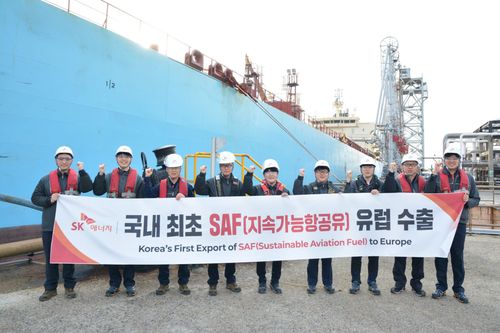SK Energy takes flight with first European export of SAF

SK Energy representatives pose for a commemorative photo on January 4 (KST) at the SK Innovation Ulsan Complex dock, following the loading of sustainable aviation fuel (SAF) onto a vessel for export to Europe. / SOURCE: SK Energy
January 9, 2025
BY SK Energy
SK Energy has successfully exported sustainable aviation fuel (SAF) to Europe, marking a first for a Korean refiner. This milestone comes just four months after the company commenced commercial production, completing a global value chain for SAF.
With the European Union (EU) initiating mandatory SAF usage this month, SK Energy has swiftly entered the market, establishing itself as a leading producer with its robust large-scale production system. On Jan. 5 (KST), SK Energy announced the export of SAF, produced through co-processing methods that refine bio-based materials such as used cooking oil and animal fats.
Since January, EU countries have mandated that at least 2% of aviation fuel must consist of SAF. Currently, Europe is the only global market with such a requirement. Industry analysts recognize SK Energy’s success in capitalizing on Europe’s SAF market, underscoring its status as the first Korean refiner to establish a large-scale production system for SAF.
Advertisement
SK Energy began commercial production of SAF in September last year, utilizing Co-Processing technology. This approach integrates bio-based material supply lines into existing petroleum production processes, enabling the production of low-carbon products like SAF and bio-naphtha. SK Energy has secured a competitive advantage in exports by establishing a production capacity of approximately 100,000 tons per year for SAF and other low-carbon products.
An SK Energy spokesperson stated, “Our extensive production system, bolstered by the R&D expertise of SK Innovation Institute of Environmental Science and Technology, and the engineering proficiency at SK Innovation’s Ulsan Complex, was pivotal in achieving this export milestone.”
In collaboration with its affiliate, SK On Trading International, which invested in a waste-based raw material company, SK Energy has successfully closed the loop on a global value chain—from raw material acquisition to production and sales.
Looking ahead, SK Energy plans to expand its domestic supply and continue its growth in the global SAF market. Since the International Air Transport Association (IATA) pledged to achieve Net Zero by 2050 plan in 2021, global SAF demand has grown steadily. The IATA aims to reduce the aviation industry’s CO2 emissions by 50% compared to 2005 levels by 2050.
Advertisement
In line with these goals, the EU has mandated that all aircraft departing from Europe must use at least 2% SAF, with plans to increase this to 6% by 2030 and 70% by 2050. The United States also targets transitioning all aviation fuel to SAF by 2050.
Lee Chun-kil, CSO of SK Energy, Head of SK Innovation Ulsan Complex, stated, “We will closely monitor domestic and international SAF policy changes and market demands to expand SAF production and exports.”
Related Stories
U.S. fuel ethanol capacity fell slightly in April, while biodiesel and renewable diesel capacity held steady, according to data released by the U.S. EIA on June 30. Feedstock consumption was down when compared to the previous month.
XCF Global Inc. on July 8 provided a production update on its flagship New Rise Reno facility, underscoring that the plant has successfully produced SAF, renewable diesel, and renewable naphtha during its initial ramp-up.
The USDA’s Risk Management Agency is implementing multiple changes to the Camelina pilot insurance program for the 2026 and succeeding crop years. The changes will expand coverage options and provide greater flexibility for producers.
EcoCeres Inc. has signed a multi-year agreement to supply British Airways with sustainable aviation fuel (SAF). The fuel will be produced from 100% waste-based biomass feedstock, such as used cooking oil (UCO).
President Trump on July 4 signed the “One Big Beautiful Bill Act.” The legislation extends and updates the 45Z credit and revives a tax credit benefiting small biodiesel producers but repeals several other bioenergy-related tax incentives.
Upcoming Events










